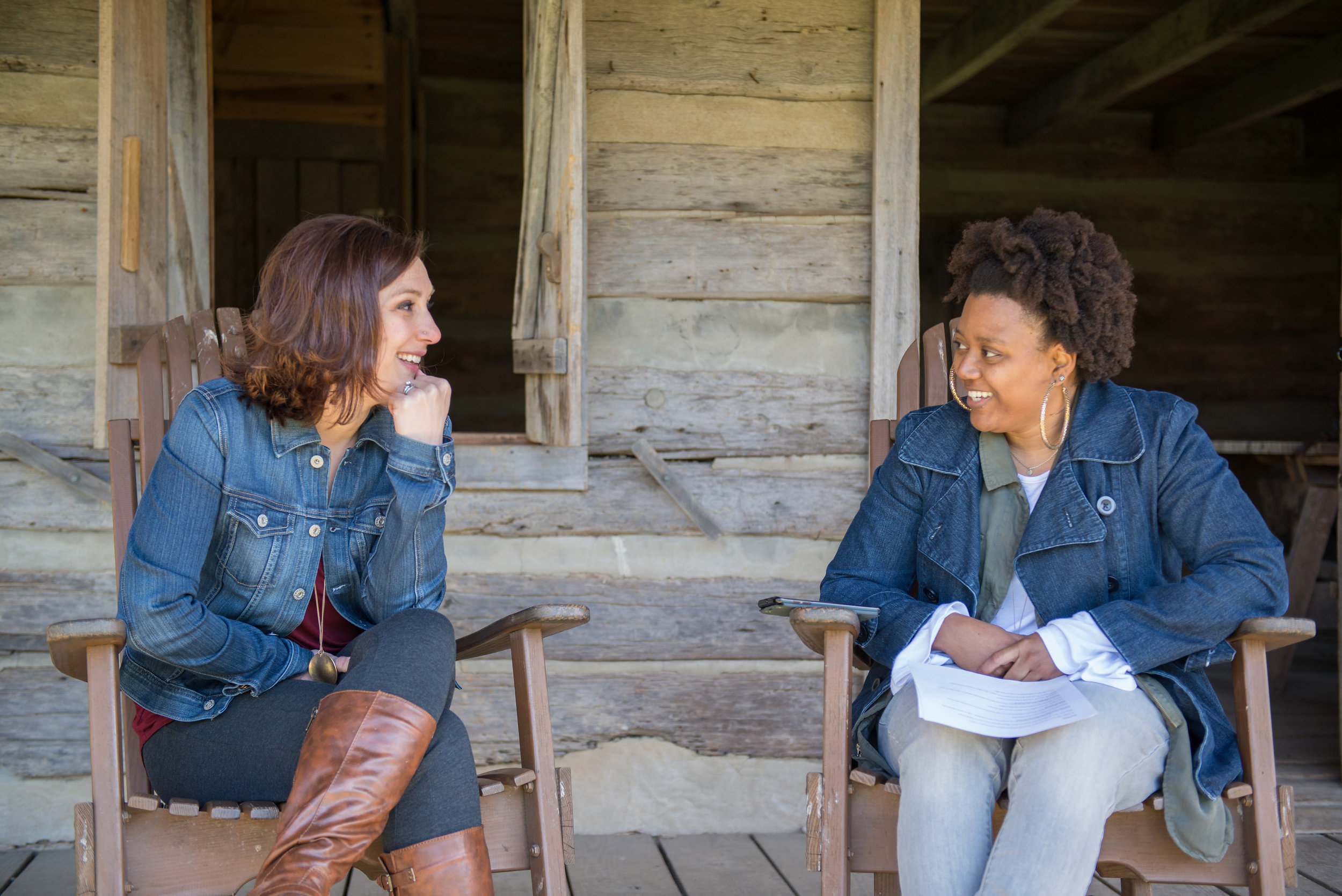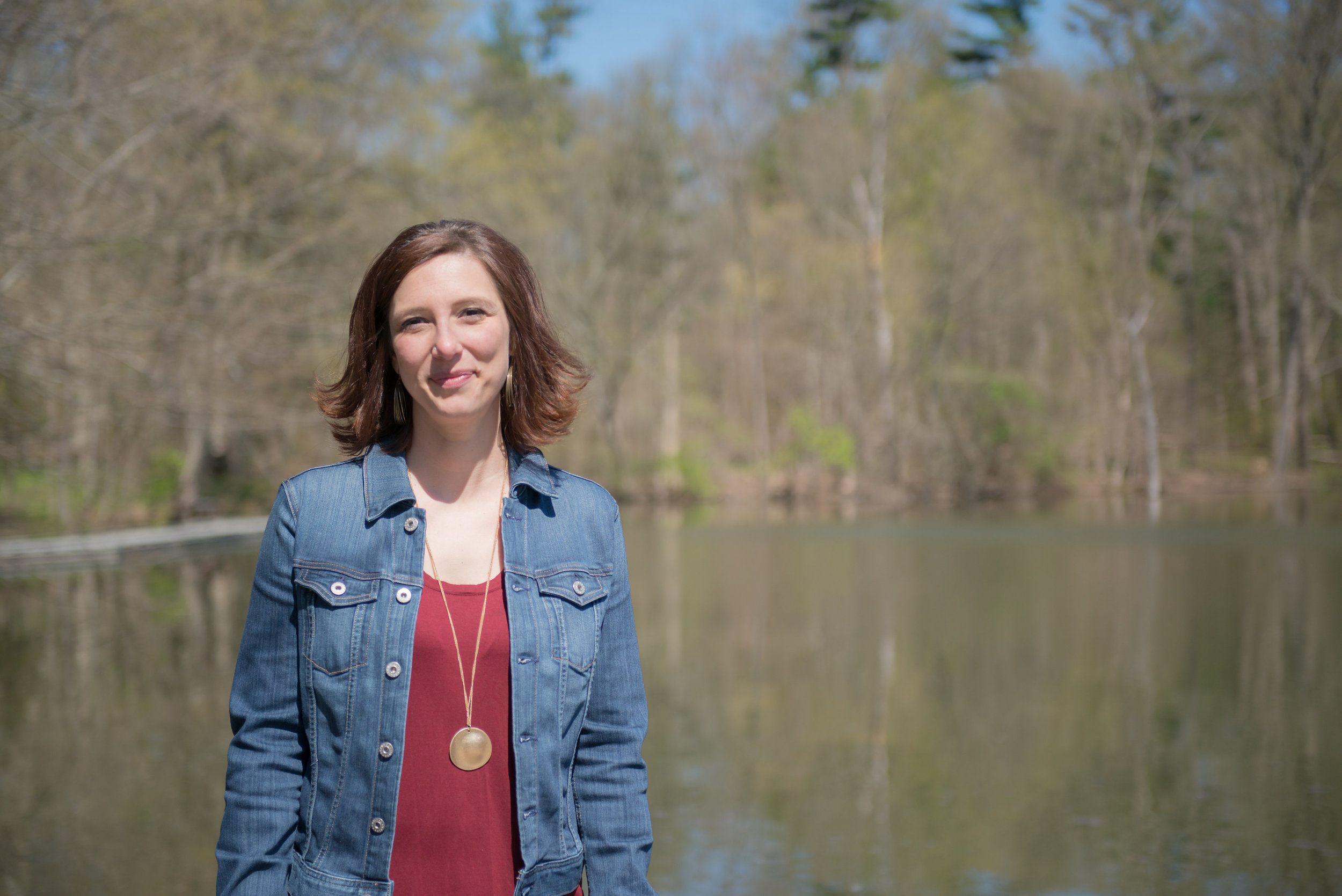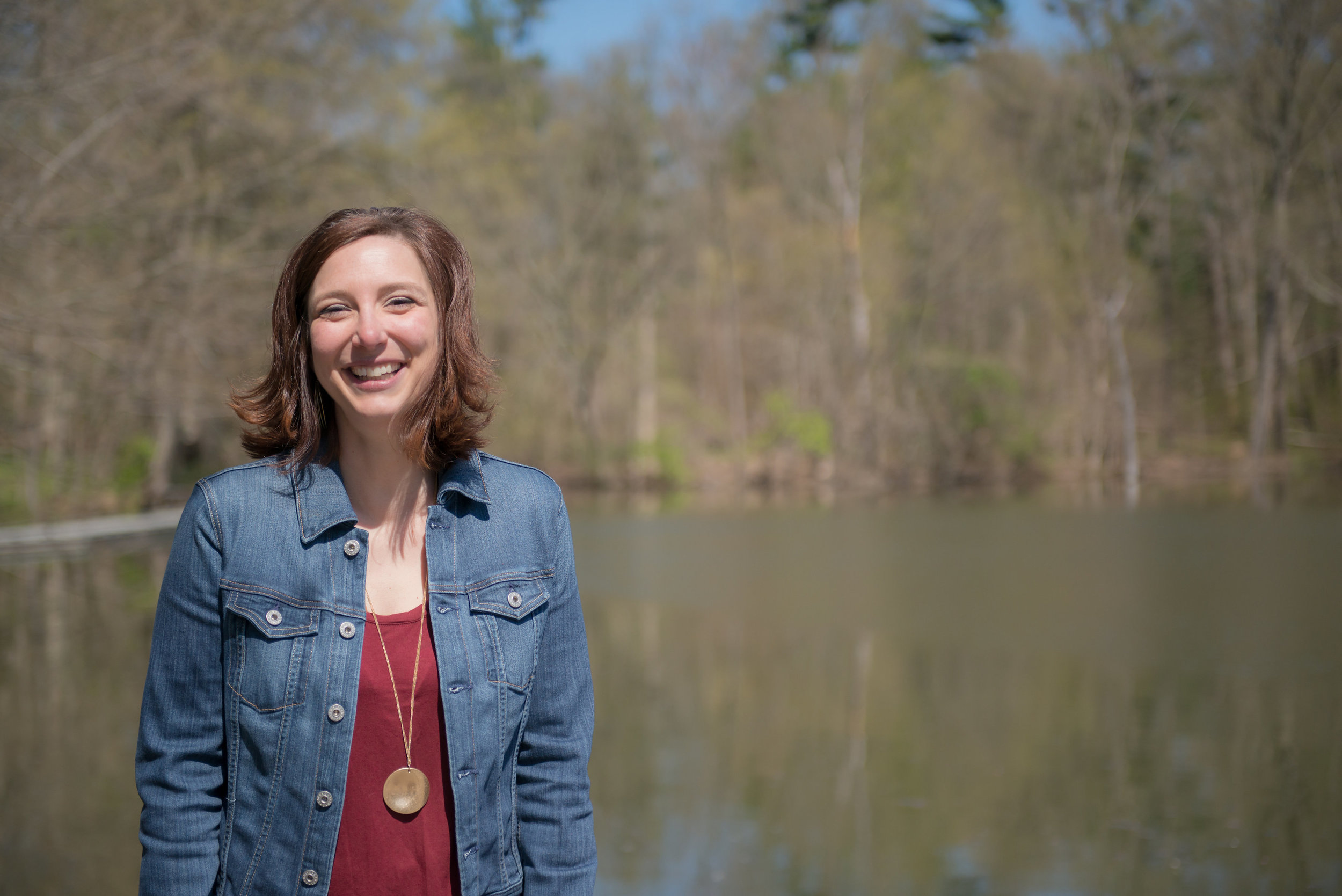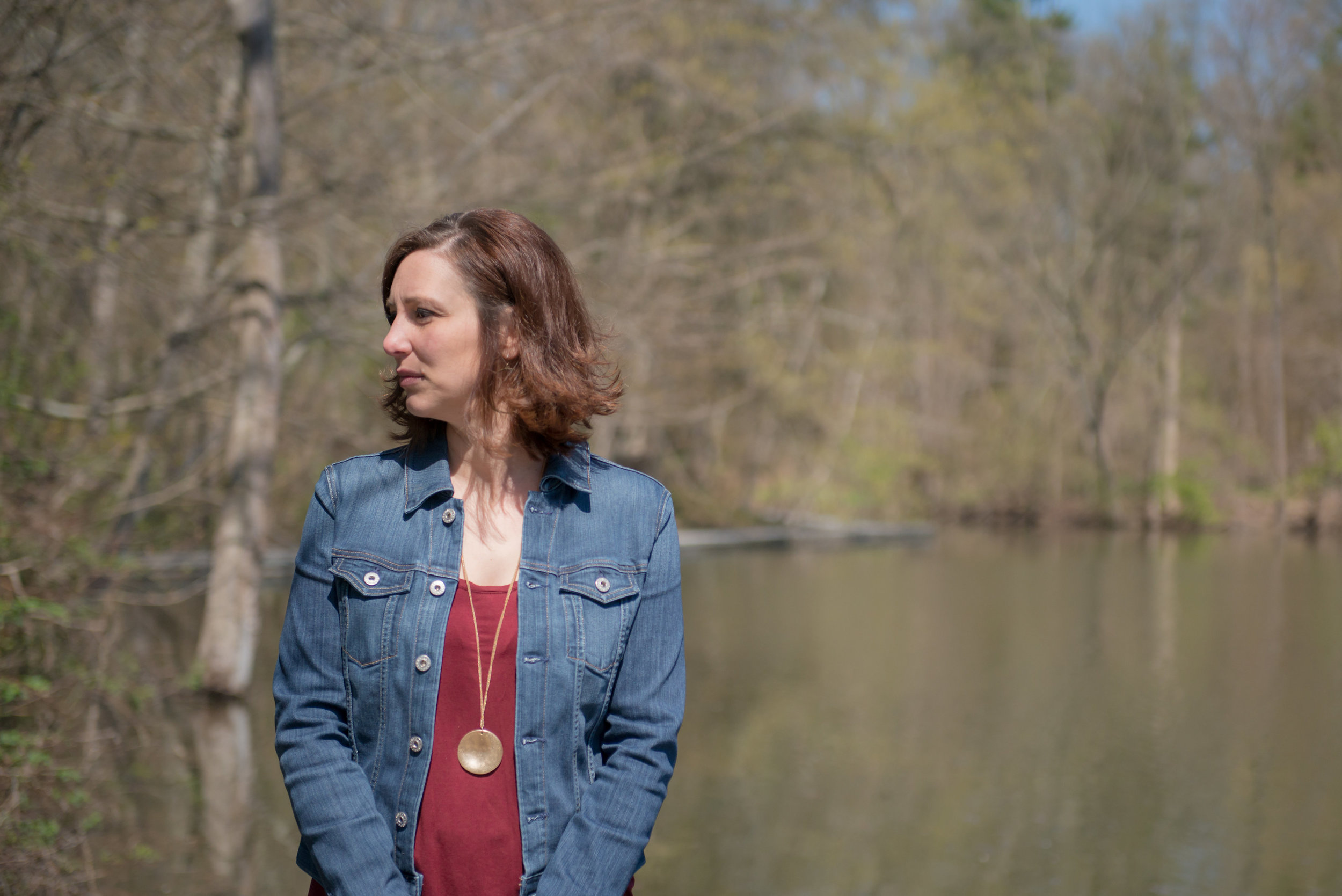Amy Vann: Give Like a Mother
It was a very cold April morning when we sat down with Amy Vann, founder of Give Like a Mother. The air was crisp, the sun was bright, and the scenery at the Cincinnati Nature Center was absolutely gorgeous. With an inviting energy and a smile that could light up any room, Amy opened up about her childhood, the important role faith plays in her life, and her aspirations for her nonprofit organization. Here is a glimpse of her inspiring story.
Interview by Kristyn Bridges. Photography by Stacy Wegley.
To begin, tell us a little bit about yourself. Were you born and raised in Ohio?
I’m from a little town called Gallipolis, Ohio. We lived there until I was about 9 or 10; then we moved to South Carolina. My dad’s a nurse anesthetist as well; he got his degree there, then we moved to West Virginia. We lived in Point Pleasant, and when I went to college, I stayed and went to Marshall University. I got my nursing degree there, and when I decided to go to anesthesia school, University of Cincinnati was a great fit, so I came here. That was in 2007, so I’ve been here a little more than 10 years.
What was your childhood like? How has that influenced the work you’re doing now?
So, my parents have a unique story. My dad was 16 and my mom was 20 when they got married. [Laughs.] A little robbing the cradle action. No one really believed in them, but they just knew it was right. They are incredible. They took turns going back and forth to school; my dad got his associate degree in nursing, my mom got her teaching degree, and then they both went back to get their master’s. From an academic and love standpoint, they’re a really good story, but because it took so long and they had babies in between, we just had very little. And West Virginia was very economically depressed, so I knew a lot of that. Being a kid and seeing poverty is so much different than being an adult or mother. We were just taught to be happy. We were never hungry; we always had the things we needed, but we shopped at yard sales, and we didn’t ever go out to eat. But to me, those were just extras.
We went to a tiny Christian school; we didn’t have the bullying. But when we moved to South Carolina, we went to a private school in Charleston. The South is intense with their stereotypes and the way you should be. My mom was a teacher at the school, so our tuition was free there, but it was very hard because we didn’t have any money. When you go to anesthesia school, you’re not allowed to work because you go to class and you also do your internship in the hospital, so there’s no time for a job. So, we lived on my mom’s teaching salary which – we all know – teachers don’t make enough.
If you had all of the resources and you knew it would succeed, what would you do with it?
So, in the South and in a private school, everybody has money, but we’d go to yard sales every Saturday and look for clothes. And – I’ll never forget – I had this pair of boxer shorts. I didn’t know they were boxer shorts. I just thought they were cute shorts, you know what I mean? I got made fun of a lot because we didn’t have a lot, but I was just like, “I’m good. You don’t want to be my friend? That’s fine.” But a teacher made fun of me. She said, “Why are you wearing your dad’s underwear today?” And it was in front of all the kids!
So ridicule and stuff like that really carries heavy on me. Kids are so mean. You shouldn’t have to deal with that. That’s not the main point for Give Like a Mother, but it’s really on my mind when I get clothes for the older kids and teenagers. When you’re 4 or 6, you don’t care, but you know, when you’re 12 and girls are making fun of you and stuff like that, that’s a big deal to me.
When I think about all the things, like I said, it’s so different seeing poverty as a child than as a parent. I think about a lot of my friends’ or even family members’ homes, and when you’re a kid, you’re like, “Oh, this is really small or dirty,” and then you’re like, “Let’s go outside and play.” [Laughs.] I mean, some of the places are still vivid in my memory and I think, you know, kids were sleeping on the floor in there, or there were three kids to a bed with no sheet. It’s a way different perspective as an adult.
We just want to be a part of the change. I don’t think you’re going to change the adult generation, but generational poverty is a really big deal. We work with this group called Empower Youth who is trying to make a change with the children of this generation. They do food packs so kids that don’t otherwise eat (except at school) have food to go home with them on Friday. That’s probably the main thing that everyone knows that they do, but what they’re really doing is building relationships with these kids. They send them to camps on scholarships, they teach them about God, and they teach them how to get out of poverty. So I’ve been working with them a lot. We’ve put our flyers in their food packs for several weeks in a row. If you don’t have food on the weekend then you probably don’t have shoes that fit you or the next season of clothing, so that, for us, was kind of a way to vet people a little bit. So that’s kind of how we got started.
A series at Crossroads Church inspired you to create Give Like a Mother. Tell us more about that and how Give Like a Mother got started.
Yeah, I go to Crossroads Church. They do a journey in the beginning of each year. So, the BRAVE journey was about finding something that God could use you for and being brave in that. So there were a couple challenges they had, and one of them was, “What do you think that God has in store for you? Have you had an idea about this? If you do, share that with somebody.” You can have an idea brewing for a long time and once you tell somebody, they might say, “How’s that going?” And you gotta go, “I’m not doing that.” [Laughs.] So the other thing is to take your idea and then develop the big idea. If you had all of the resources and you knew it would succeed, what would you do with it?
This has evolved a lot, but I immediately just thought, “I would like to take all the people that have things that they are not using and take all the people that need things and be the bridge for that.” I see that a lot where I work. We kind of have a unique relationship with people across all economic backgrounds. In anesthesia, we’re close with our surgeons who make tons of money, and then we’re close with everybody in between. You just get to be a really good family.
So things came up several times that year. One of the ladies that clean the operating room between cases, her daughter was on heroin. She got custody of her grandkids and her daughter’s boyfriend wouldn’t let them in the house, so she’s got these two babies but not a sock, a crib, or anything. And my youngest one was 2, so we just started talking and we said we were going to work this out. And in about three days we got them a crib, a high chair, a toddler bed, big bins of clothes for each size of kids, and I just thought, “This! This is what needs to happen all the time.” But you can’t do it if you don’t know who’s in need and don’t know who has things. Most of the time, those people don’t know each other, you know; it’s a gap. So that’s how it started and both of those things together, and a couple of other situations, just really pushed me to say, “This is where I’m supposed to be; this is what I’m supposed to do. I’m supposed to be the bridge.”
It took me a while to do the “tell someone” part. Finally, my husband and I were just sitting together and I was like, “I’m ready to tell you my big idea!”
And he was like, “What? What are you talking about?” [Laughs.] So I told him and at that point, my daughter was just over a year, probably about 14 months old, and my son was not quite 3, so a lot was happening and I said, “I want to do this where people can come, receive, and do all of this and be a liaison between people.” My idea is that I could do it with Crossroads and that could get the word out. Crossroads has churches all over the city, so we could have teams at each place – eventually – and each Crossroads could have a place like this where you can give and receive, so then we can reach the whole city.
And he’s like, “Okay… You want to do it now?” [Laughs.]
And I said, “I’m not sure.” So it was another year/year and a half before Crossroads came to the east side, and I thought, “This is it!” This really propelled me to say, “I want to pursue this. The kids are older and they’re easy to take care of. My husband’s such a wonderful partner.” I 100 percent couldn’t do it without him. He loves the idea and is just so supportive and he loves to keep the kids. So I don’t feel bad when I have to leave them for things; they’re having a good time and he’s not resentful, and that’s so important. My husband is super cynical and brings up everything that could go wrong, and I’m really “pie in the sky; nothing could go wrong.” We joke about it a lot, but it really works.
What role does faith play in your journey?
I’ve always grown up in a Christian home. My mom was the youth pastor of our church when I was in the youth group, so it was kind of always a church family. I know everybody has different feelings about faith, religion, God, and spirituality, but I believe that some people are just called to do something by God. Being “called” is kind of a cliché term, but I mean, I feel like this is definitely what that was. I don’t really knock on wood, but nothing has been hard yet. Like, everything just worked, you know. Things were just falling into place and everything that’s fallen into place couldn’t have been by coincidence. I think that God provides because I’m following my calling. So, people call that coincidence and all that but it’s just so undeniable. We could be in a crowd of 200 people and I happen to stand next to somebody who ends up hearing about us and ends up helping with something we’re doing, and every time you’re like, “There You are again.” [Laughs.] Pretty amazing.
What age group does Give Like a Mother serve? And what kind of circumstances are these children facing?
We accept clothes of all children’s ages. We started in elementary schools by doing the food packs. On the form, it says if you have infant children at home or older siblings, or you know any children that need assistance, please put it on there. We’ve been getting forms back with everything from babies to seniors in high school.
I’m still figuring out what their home life is like, because I’m going to meet them for the first time when we deliver. They can pick up their items at school, but a lot of people are choosing to have them delivered at home, so I’m anxious to meet them and build relationships with the family.
One story that I have is about a little girl. We started at Amelia Elementary, and I met the nurse and nurse’s aide there and they said, “We’re so glad you’re doing this.” They had a little girl who had blisters on her calves. She was wearing plastic rainboots and they told her that the shoes were rubbing blisters on her legs and she needed to wear her gym shoes. She started crying and said those were the only shoes she had. They have a little closet there, but it’s sparse, but they just so happen to have shoes there that fit her, and she wears them every day now. These are the kinds of kids I want to serve. That person lives down the street from us, you know. You don’t have to go to another country to find that.
Why the name “Give Like a Mother”?
It sort of just came to me. As a mom, you give everything you have. You know, the old cliché of “I’ll give you the shirt off my back” is true. You’d do that for your child, and sometimes that’s just not enough. It’s kind of a sassy name, but it really is a challenge. If you’re giving like a mother, an actual mother, then you’re giving everything you can.
What items do you collect, and where can people donate?
Clothing, shoes, coats, seasonal wear, from newborn to adult clothing that a teenager would wear – no grandma sweaters. [Laughs.] The drop off is a little vagarious right now. So far, what we’ll do mostly is we’ll go meet people. I’ve learned that I always have to make it convenient for me and my family. For a while, I was just meeting people everywhere and then I was never seeing my family, so I just kind of figure out individually where people are, and I have friends who can help bring things to me. It’s a lot of coordinating, but it’s worked out. We don’t have an actual drop off location yet. We are hoping to get a permanent location and a drop off center, but that’s going to take a little bit of time and some funding.
Where did your love and passion for kids begin?
I do love kids. I wouldn’t say I would be a good daycare worker or teacher because I’m not that kind of person. You know how people are like, “I just wanna be around kids all the time” – I’m not really like that. [Laughs.] But I have this almost debilitating heart for neglected, abused, or underserved children. I don’t really know where that came from.
My dad is so giving. We drove by this homeless guy two days in a row and he said, “We’re going to get him some clothes and some food.” That’s just how it was. And when we were growing up, we kind of started to be like that and I’d say, “There’s this girl at my school…” and my dad would be like, “Let’s take care of her; let’s do this; let’s find this.” He was just a doer and a giver. You find something that needs to be done, let’s take care of it. If you can’t take care of it yourself, let’s find people that can. So that’s probably where the passion and drive comes from. You just saw that it works and people were grateful.
It’s very important to me that my family knows that this is important to me but doesn’t replace them.
The news is not allowed to be on in my house. I can’t watch it: It’ll keep me up for days. You hear one story about a kid and I just can’t. It makes me nauseous. I don’t really know why it’s like that, but during this whole BRAVE journey, I thought a lot about that and thought, “Maybe this is the thing that I should do something about.” If you can’t watch the news, that’s fine, but then do something about it.
What challenges have you faced, and how did you overcome them to stay true to your mission and keep moving forward?
There’s been some things along the way. When I thought 100 percent I was going to do this and I went to the Crossroads pastor, I thought they were going to pour into this. But them saying no was kind of a personal wakeup call, like, this is my project and I can’t rely on somebody else to do it. So, I was in the parking lot and I cried a few tears. Then I was like, “All right, next! That’s not going to stop me. This isn’t going to kill my dream. This is my project whether it was just me or not.”
It’s been very hard to find volunteers. I mean, people have lives, jobs, families, activities, and everything, so it’s hard to carve out a real spot for something that’s not only not your idea, but something you didn’t even know you had space for. I kind of thought I was going to get a consistent team of people and the normal pop-in here-and-there volunteers, but that’s proven to be challenging. But my husband has been so supportive and things are starting to pick up. I just prayed a lot about getting the right type of people and I just stopped being disappointed about these things, because again, I understand that people have lives.
The biggest thing right now is that our location is not big enough and funding is a big deal. We just need a big location. We have two storage units where we keep our stuff and it’s overflowing and it’s really inefficient. But we’ll get there!
Where do you see yourself in the next 5 years?
We just had this conversation the other day with my friend and he asked, “Can you see yourself doing this more than you’re doing anesthesia?”
And I said, “Really, honestly, I could!” I could never give up anesthesia – I love it so much – but I love this and it’s my passion. I can tell that it’s what I’m supposed to be doing and I don’t have to give up one thing or the other, but to work less at the hospital and more at this, to have office hours where people can drop off and pick up would be great. I’d like to have a real staff that I can pay. My friend is so dedicated – her name is Barb – and between Barb and my husband, I mean, I couldn’t do it without them. What I’d like to do is hire her. She needs an income and I could give it to her. She’s so helpful.
And I’d like to be throughout the city. I think 5 years is enough time to get established and get grants, funding, and regular donors, so then we can depend on incomes and get locations and space. And then staff so it doesn’t rule my life like 100 percent. It’s very important to me that my family knows that this is important to me but doesn’t replace them. And I’d like to spread to schools.
What advice would you give to someone wanting to give back to their community?
In general, I think there is a huge network of nonprofit organizations that serve so many different things. People can find their passion and pour into a project. So find what drives you and get involved. People think, “Oh, I can’t get involved with one more thing,” but if 10 people think, “I can probably carve out a couple of hours once a month to do that,” then look at how much help you have! You know, you don’t have to be on the board of directors.
For us, we constantly need volunteers and that looks like a lot of different things. It looks like sorting and organizing clothing; it looks like being a drop off and distribution site, cleaning some clothes; it can be accounting or graphic design.
Tell us about an influential woman in your life.
My mom and my grandma! My grandma is undeniably the most giving. She is that person that loves kids and wants them around all the time. She always had foster kids and she would babysit at any time. She just loves to be around kids. She taught Bible and Sunday school, and just loved to teach and help kids, and people in general. And her faith in God was so unshakeable. She went through a lot of adversity in her life, but it never got her down. She would hit her knees and take her glasses off – she would always take her glasses off when she prayed. That meant she was getting serious. My husband and I joke that if we ever need anything to be prayed for, we should choose the closest person to God that’s on earth, so we always joke like, “Okay, let’s tell my grandma.”
And then my mom is this unbelievable, strong woman. She always taught us that we can do anything. People say that, but like, I really thought I could do anything that I wanted to do and I could be anybody that I wanted to be. As an adult, and now a mother, I appreciate that so much more. You hope you teach that to your kids, but you’re not sure if that’s going to make it through, you know. And she had so many things that happened in her life that she just powered through and I just always remember her saying, “You need to be able to support yourself. You are strong and you can do anything that you want.”
Do you know an awesome woman of Cincy? Nominate her here! New features launch every Monday.






